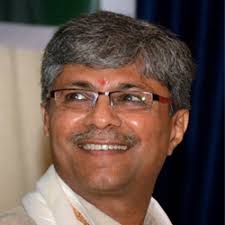The Government has extended the services of Vaidya Rajesh Kotecha as secretary in the Ayush ministry for a period of two more years. His tenure was due to end on June 28 and has been extended till 2022 by the Appointment Committee of the Cabinet. Earlier, he was appointed for period of three years on contractual basis.
Kotecha’s appointment three years ago is considered among the first instances of a lateral entry into a secretary-level position from outside the civil service. 57 year old Kotecha is an Ayurveda physician and a recipient of the Padmashri for Medicine in 2015. He is a former Vice Chancellor of Gujarat Ayurveda University, Jamnagar, a post he held from 2013 to 2016. Kotecha if on record that he first met Narendra Modi in 1988 when the latter was a BJP NGeneral Secretary and had come to inaugurate one of his Ayurveda clinics. came to inaugurate a clinic in Jaipur. His CV proudly proclaims him as a ‘Trustee, World Ayurveda Foundation, an initiative of Vijnana Bharati, (and) Advisor to the Vijnana Bharati, the biggest science and technology movement in India’.
The extension granted to him comes even as the AYUSH Ministry and the CSIR announced they are working on four traditional medicine formulations to treat coronavirus infection and trials are to begin soon
While his appointment had raised quite a few eyebrows, his extension is likely to do the same as relevant service rules with respect to extension of services provide that, no proposal for extension of service beyond age of superannuation should ordinarily be considered. It can only be justified in rare and exceptional services. The overriding consideration for grant of extension of service must be in public interest and must satisfy two conditions:-
· That other officers are not ripe enough to take over the job.
· That the retiring officer is of outstanding merit.
No extension of service should be considered on the ground that a suitable successor is not available unless it is established that action to select a successor had been taken well in advance but the selection could not be finalised in time for justifiable reasons.
A proposal for the grant of extension of service based merely on the consideration that the officer’s predecessor had been given extension should obviously not be accepted.
The difference between contractual service and contractual extension is that in Contractual service are the type of employment in which one has to sign a contract at the beginning of the job, according to which one has to agree to do this work while agreeing to all the terms and conditions mentioned in that contract. In contract work, usually, a job is done for a certain period of time at a certain salary, which is provided to the person doing the works at the end of the project or assignment. Employees are hired for contract jobs in almost all government departments, including education department, health department, railway, judiciary, bank, roadways etc. These government departments keep issuing notifications from time to time for hiring people for contractual jobs.
Whereas, contractual extension is all about extending the terms of earlier contract for a period as agreed by the parties. The terms and conditions of the earlier contract are not changed while granting extension.
It is a settled position that when the government grants extension the opportunity is curtailed for another officer who could have succeeded to the post. That is why extension cannot be granted out of sweet will but there must be compelling reasons such as public interest for the authority before granting extension of contractual service.
In 2014, the Government of India appointed Nripendra Misra as the principal secretary to PM through the Appointments Committee of the Cabinet (ACC) and was given the rank and status of Cabinet Minister, the Government of India. To confirm Misra’s appointment, the Telecom Regulatory Authority of India Act, 1997 had to be amended, first by a temporary ordinance and then by an Act as one of its provisions barred a former TRAI chairperson from holding any office in the Government of India or any state or union territorial government.
Vaidya Rajesh Kotecha completed his Bachelor of Ayurveda Medicine & Surgery (BAMS) from Gujarat Ayurved University, Jamnagar, in 1985 and his Doctorate in Ayurveda Medicine (M.D. Ayurveda) from Gujarat Ayurveda in 1991.
Vaidya Rajesh Kotecha is the author of two books: Concept of Atattvabhinivesha In Ayurveda, which discusses minor psychiatric disorders within Ayurveda parameters, and A Beginner’s Guide to Ayurveda, which is about Ayurveda principles and day-to-day life practices to remain healthy. He also received the Global Ayurveda Physician Award in 2007, the Ayurveda Ratna Award in 2008 and Padmashri Award for Medicine in 2015. He founded Chakrapani Ayurveda Clinic & Research Center in Jaipur in 1998.
-India Legal Bureau


